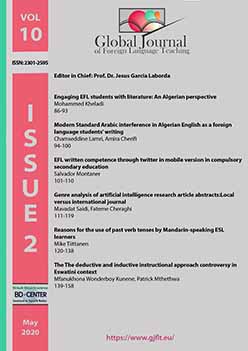Reasons for the use of the present perfect, past perfect and past progressive by Mandarin-speaking ESL learners
Reasons for the use of the present perfect, past perfect and past progressive by Mandarin-speaking ESL learners
Author(s): Mike TiittanenSubject(s): Language studies, Language and Literature Studies, Education
Published by: Birlesik Dunya Yenilik Arastirma ve Yayincilik Merkezi
Keywords: Past perfect; past progressive; present perfect;
Summary/Abstract: This exploratory study investigated the contexts in which a group of native Mandarin ESL learners, with high knowledge of the simple past tense, would use the present perfect, past perfect and past progressive on a fill-in-the-gaps task. The participants frequently correctly used the past perfect form on a task item requiring these forms, but they also often oversupplied the present perfect, past perfect and, to a lesser extent, the past progressive, on the task. Participants who correctly supplied the past perfect had a higher overall level of grammatical knowledge than those that did not. The learners reported that the presence of adverbials sometimes led them to their choice of the present perfect or past perfect. The oversuppliances of the past progressive were primarily atelic activities. These results mirror other studies in the confusion between past tense forms, influence of adverbials and lexical aspect. They may also possibly indicate L1 influence from Mandarin.
Journal: Global Journal of Foreign Language Teaching
- Issue Year: 10/2020
- Issue No: 2
- Page Range: 120-138
- Page Count: 19
- Language: English

